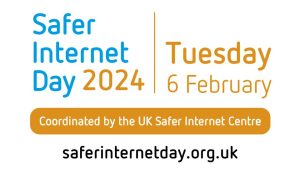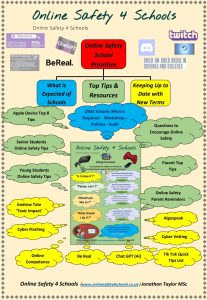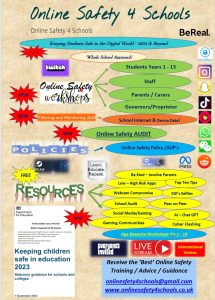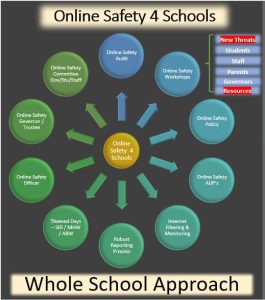
‘Achieving Best Practice in Online Safety in Schools’

February 6th, marked Safer Internet Day (2024 Theme – ‘Inspiring change? Making a difference, managing influence, and navigating change online.’), a day in which we are all encouraged to pay particular attention to the importance of keeping children and young people safe online. this year Safer Internet Day focused on technological changes, this includes covering.
- Young people’s perspective on new and emerging technology
I thought I would embrace ‘new technology’ and use Artificial Intelligence and ask a Chat GPT how it would define Online Safety for Schools. Chat GPT defined it as follows:
However, with far more emphasis being put on Online Safety within ‘Keeping Children Safe in Education’, the new requirement of specific Online Safety education adds to the importance of receiving the most up-to-date, relevant, and appropriate Online Safety Training. Whilst KCSiE 2024 will see no changes to ‘Online Safety’ within the document, this does not take away from what are the Legal and Moral expectations of all Schools – Hence Online Safety ‘Best Practice’

Regardless of any school’s location around the world, students grow up with access to computers, gaming devices & smart phones, all with access to the internet. This makes the Internet more accessible and became so important for remote learning during the pandemic, that has seen an increase in usage and screen time. Furthermore, most students love to explore and experiment, with Social Media, Apps, Games, and Gaming Communities, therefore British and International Schools now require specific bespoke Online Safety workshops for Students, Staff, and Parents, along with guidance on creating and maintaining Policies to keep Students, Staff, and the School safe.
So, Online Safety for Schools is far more involved and needs far more clarification. Online Safety within Safeguarding is certainly now very much ‘standalone’ and requires specific training/workshops for the Whole School, Staff, Students & Parents. Keeping Children Safe in Education (UK), prioritises Online Safety Training for all schools, and robust Filtering & Monitoring in Schools, therefore schools should now consider Online Safety as a statutory requirement as well as ‘Best Practice.’ Online Safety workshops are of paramount importance irrespective of country or location. All children, teenagers, and young adults use devices, social media/apps / online games which can have a massive impact on their safety, future goals, and targets (Cyber Vetting for Employment & Universities). Bespoke Online Safety training/workshops should be considered a safeguarding necessity as well as a legal priority pending any inspection by the Schools Inspectorate.
Achieving Best Practice in Online Safety in Schools
Chat GPT is quite correct Online Safety is about creating a secure digital environment for students and staff – educating and enforcing measures to prevent exploitation, and promoting responsible online behaviour, but how?
Whilst the responsibility of Online Safety falls on the Designated Safeguarding Lead (DSL), or the Online Safety Coordinator (OSC), achieving best practice must involve, Governors / Executive / Directors – Senior Leadership Team – DSL / OSC – Staff – IT – Parents – Students, ‘The Whole School Approach.’ Creating and implementing an effective Whole School Approach to Online Safety is not easy, and requires dedication, commitment, and understanding of the current Online Safety guidelines, statutory requirements, and recommendations.

The Whole School Approach can be described as; creating a culture that incorporates the principles of online safety across all facets of school life. Schools must seek to achieve best practice in supplying online safety within schools from workshops for students, staff, and parents to robust filtering monitoring and reporting practices. Employing the online safety principles consistently will allow for best practice to be exhibited. This includes expecting the same standards of behaviour whenever a pupil is online at school – be it in class or using their own device.
The Promotion of ‘Best Practices’ in schools must include ‘Online Safety by incorporating.
1. Online Safety Audit – an annual Online Safety audit is expected and extremely vital, it allows schools to identify areas of strength and those that require development.
2. Whole Staff – Governor Executive Training – Online Safety CPD training must be available for all staff and school governors / executives. Student & Parent Workshops – These must be age relevant and updated to be of any value to students and parents.

3. Online Safety Policies – Acceptable Use Policies – A standalone Online Safety policy must be created and available to the whole school community
4. Acceptable use policies, for all (staff, students, parents, visitors), must be clear, concise, robust, and enforceable
5. Robust & Integrated Reporting Routines – students and staff must have a clear reporting process; the Designated Safeguarding Lead and Online Safety Lead details must be published and accessible.
6. Monitoring & Filtering – Schools now have a statutory requirement to monitor and filter students internet usage to prevent inappropriate access. This can be through local authorities or private companies offering monitoring software.
7. Involvement in Themed Days – Schools should use, Safer Internet Day, Anti Bullying Week and Mental Health Week as a way of prioritising Online Safety to keep the whole school community involved.
8. Online Safety Coordinator – to work in parallel with the DSL and monitor staff online safety and the implementation of the ‘Whole School Approach.’
9. Online Safety Governor / Trustee / Executive – to be appointed and to oversee the Whole School Approach to Online Safety and authorise policies.
10. Online Safety Committee – Governors, Students, and Staff to meet and discuss the schools’ Online Safety approach, from policies to use of devices within school.
………………………………………………………………..
Like the Internet, Online Safety is here to stay, so Schools should not wait for the next School Inspection, or the next Keeping Children Safe in Education document, schools should be seeking the most accurate and relevant Online Safety Training to ensure they are keeping the Whole School Community safe.

Jonathan Taylor MSc (OnlineSafety4Schools)
www.onlinesafety4schools.co.uk
email : onlinesafety4schools@gmail.com
